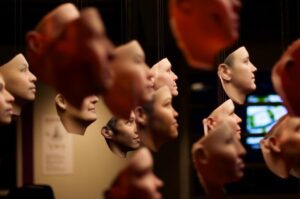Welcome to FindBiometrics’ digest of identity industry news. Here’s what you need to know about the world of digital identity and biometrics today:

BIPA Lawsuit Accuses OpenAI of Scraping Face Biometrics From Internet
OpenAI and Microsoft are facing a lawsuit under Illinois’s Biometric Information Privacy Act (BIPA), for allegedly collecting the face biometrics of individuals depicted in photos on the internet without the individuals’ knowledge or consent. OpenAI’s scraping of text data for the training of its GPT large language model has been well documented. Whether the company also used biometric data to train its image generator, DALL-E, is a much murkier question. The answer may not matter: In a separate BIPA case concerning a face-scanning dashboard camera used in the trucking industry, a recent ruling suggested that what matters is the collection of biometric data itself, and not necessarily the purpose for which it was collected.
Another Insurer Is Compelled to Cover Client in BIPA Case
A new ruling from the US District Court for the Northern District of Illinois has ruled that Continental Western Insurance Co. must cover its client, Tony’s Finer Foods Enterprises, in its defence in a lawsuit under BIPA. The lawsuit revolves around the supermarket chain’s use of a fingerprint-scanning time and attendance tracking system for its employees, allegedly without obtaining explicit consent. It’s the latest BIPA case in which a court had to compel an insurer to cover a defendant, after a judge determined last month that Citizens Insurance Co. of America couldn’t get out of covering a client involved in selling access to Clearview AI’s controversial facial recognition platform for law enforcement.
Former North Macedonia Official Convicted In Contract Award Scam
North Macedonia’s former Secretary General has been convicted of abuse of office and money laundering in case revolving around fraudulent contract awards. The awards concerned policing technologies, including a biometric identification system, and collectively amounted to €6.4 million. Together with other defendants, Dragi Rashkovski was accused of participating in a scheme in which the systems that were purchased were never actually put into use, or weren’t needed to begin with. In turn, Rashkovski claims that the judge had colluded with the prosecutor to convict him.
GAO Wants DHS to Account for Labor Costs in HART Project
A newly published Government Accountability Office (GAO) report has determined that the Department of Homeland Security has not been adequately tracking government labor costs for the development of its Homeland Advanced Recognition Technology (HART) system. Intended to replace the legacy Automated Biometric Identification System (IDENT) launched in 1994, HART has seen numerous delays and cost overruns since it was first announced in 2015. At the start of this year, Congress demanded that the DHS perform an internal audit, citing “mismanagement of the program and the program’s failure to achieve initial operating capacity”. For its part, the DHS’s Office of Biometric Identity Management has now agreed to incorporate a full accounting of costs in its next annual update on the HART Life Cycle Cost Estimate.
DoD Retirees Asked to Register in Biometric ID System
California’s Edwards Air Force Base is asking retiring or retired Department of Defense civilians to register their ID with the Defense Biometric Identification System in order to ensure that they can access the base going forward. The move is part of a broader transition to a new digital identification system, in line with a DoD initiative that will see physical ID cards phased out by May 7, 2025. But retirees’ ID cards will expire sooner, at the end of next month, prompting the need to enroll an identity document (which must be compliant with the Real ID Act) into the DoD’s biometric system.
Indiana Jones Gets a Biometric Makeover
Indiana Jones and the Dial of Destiny made $60.4 million in the North American market in its opening weekend. The final instalment in a decades-old series saw Harrison Ford reprise his titular role, with special effects artists using facial recognition technology to analyze his appearance from earlier movies and map the details onto his current face, enabling him to play a younger version of himself. Whether or not the biometric software contributed to a solid return on investment remains to be seen: The movie’s production reportedly cost $295 million in total.
–
July 7, 2023 – by Alex Perala








Follow Us